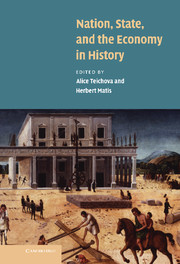Book contents
- Frontmatter
- Contents
- List of figures
- List of tables
- List of contributors
- Acknowledgements
- Introduction
- PART I
- PART II
- PART III
- PART IV
- PART V
- 18 The state and economic growth in Latin America: Brazil and Mexico, nineteenth and early twentieth centuries
- 19 Building the Brazilian nation-state: from colony to globalisation
- 20 The role of nationhood in the economic development of the USA
- 21 Economic policy and Australian state building: from labourist-protectionism to globalisation
- Index
20 - The role of nationhood in the economic development of the USA
Published online by Cambridge University Press: 07 September 2009
- Frontmatter
- Contents
- List of figures
- List of tables
- List of contributors
- Acknowledgements
- Introduction
- PART I
- PART II
- PART III
- PART IV
- PART V
- 18 The state and economic growth in Latin America: Brazil and Mexico, nineteenth and early twentieth centuries
- 19 Building the Brazilian nation-state: from colony to globalisation
- 20 The role of nationhood in the economic development of the USA
- 21 Economic policy and Australian state building: from labourist-protectionism to globalisation
- Index
Summary
In the study of American economic history, it is not standard to ask whether national political independence was essential for the remarkable economic development of the nineteenth and twentieth centuries. In accounts of US economic performance, one may read about entrepreneurship, about technological innovation, about resource abundance, inter-regional trade and migration, perhaps even about policy initiatives in transportation, banking and education; but American writers rarely stop to ask whether these sources of dynamism would have been as effective if the revolution of 1776 had not occurred. To be sure, the constitution of 1787 normally comes in for its share of praise as a guarantor of order, property rights and the inviolability of contracts; but here too the economic record of the nineteenth century is seldom reviewed with an eye towards contingency. A reader of the economic history literature might feel justified in concluding that only ‘economic fundamentals’ really mattered for America's rise to world leadership, and hence that the only essential role for the nation-state was to step aside and allow these forces full sway. This antiseptic economic history is curious, because political theorists regard the founding of the USA as a pioneering early example of nation building and the rise of national consciousness.
The goal of this chapter is to reopen consideration of this neglected topic. Because my intention is to offer an affirmative answer to the question of association between nationhood and economic development, some disclaimers at the outset may be appropriate.
- Type
- Chapter
- Information
- Nation, State and the Economy in History , pp. 387 - 403Publisher: Cambridge University PressPrint publication year: 2003
- 1
- Cited by



